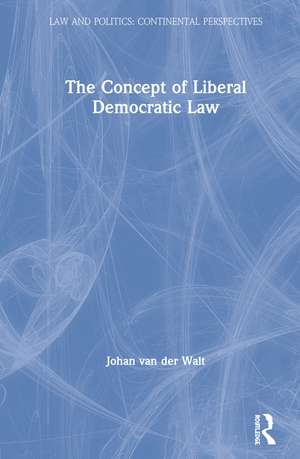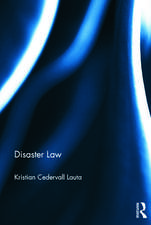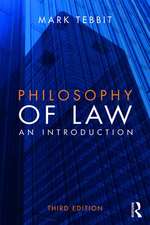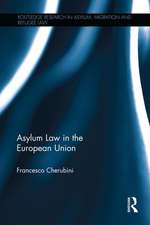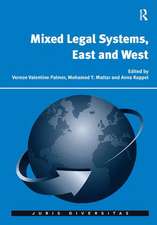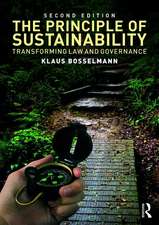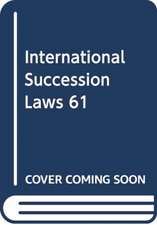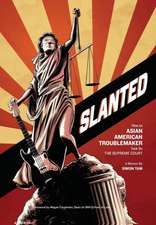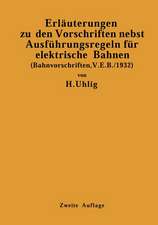The Concept of Liberal Democratic Law: Law and Politics
Autor Johan van Der Walten Limba Engleză Paperback – 30 sep 2019
It assesses the jurisprudential projects and positions of these theorists against the background of a long history of European metaphysics from which the modern concept of liberal democratic law emerged. Two key narratives are central to this history of European political and legal metaphysics. Both concern the historical development of the concept of nomos that emerged in early Greek legal and political thought. The first concerns the history of philosophical reflection on the epistemological and ontological status of legal concepts that runs from Plato to Hobbes (the realist-nominalist debate as it became known later). The second concerns the history of philosophical and political discourses on law, sovereignty and justice that starts with the nomos-physis debate in fifth century Athens and runs through medieval, modern and twentieth century conceptualisations of the relationship between law and power. Methodologically, the reading of the legal theoretical positions of Hart, Dworkin, Kennedy, Smend, Kelsen and Schmitt articulated in this book is presented as a distillation process that extracts the pure elements of liberal democratic law from the metaphysical narratives that not only cradled it, but also smothered and distorted its essential aspirations.
Drawing together key insights from across the fields of jurisprudence and philosophy, this book offers an important and original re-articulation of the concept of democratic law.
| Toate formatele și edițiile | Preț | Express |
|---|---|---|
| Paperback (1) | 296.16 lei 6-8 săpt. | +223.43 lei 10-14 zile |
| Taylor & Francis – 30 sep 2019 | 296.16 lei 6-8 săpt. | +223.43 lei 10-14 zile |
| Hardback (1) | 1004.06 lei 6-8 săpt. | |
| Taylor & Francis – 24 sep 2019 | 1004.06 lei 6-8 săpt. |
Din seria Law and Politics
-
 Preț: 311.41 lei
Preț: 311.41 lei -
 Preț: 408.54 lei
Preț: 408.54 lei - 19%
 Preț: 271.61 lei
Preț: 271.61 lei -
 Preț: 165.09 lei
Preț: 165.09 lei -
 Preț: 341.55 lei
Preț: 341.55 lei -
 Preț: 389.38 lei
Preț: 389.38 lei -
 Preț: 389.38 lei
Preț: 389.38 lei - 19%
 Preț: 257.90 lei
Preț: 257.90 lei -
 Preț: 184.03 lei
Preț: 184.03 lei -
 Preț: 326.14 lei
Preț: 326.14 lei -
 Preț: 196.21 lei
Preț: 196.21 lei -
 Preț: 389.66 lei
Preț: 389.66 lei -
 Preț: 388.26 lei
Preț: 388.26 lei - 18%
 Preț: 124.07 lei
Preț: 124.07 lei -
 Preț: 389.66 lei
Preț: 389.66 lei - 18%
 Preț: 946.61 lei
Preț: 946.61 lei - 26%
 Preț: 766.16 lei
Preț: 766.16 lei - 18%
 Preț: 1004.24 lei
Preț: 1004.24 lei
Preț: 296.16 lei
Nou
Puncte Express: 444
Preț estimativ în valută:
56.67€ • 59.33$ • 46.89£
56.67€ • 59.33$ • 46.89£
Carte tipărită la comandă
Livrare economică 05-19 aprilie
Livrare express 04-08 martie pentru 233.42 lei
Preluare comenzi: 021 569.72.76
Specificații
ISBN-13: 9780367181819
ISBN-10: 0367181819
Pagini: 282
Dimensiuni: 156 x 234 x 20 mm
Greutate: 0.44 kg
Ediția:1
Editura: Taylor & Francis
Colecția Routledge
Seria Law and Politics
Locul publicării:Oxford, United Kingdom
ISBN-10: 0367181819
Pagini: 282
Dimensiuni: 156 x 234 x 20 mm
Greutate: 0.44 kg
Ediția:1
Editura: Taylor & Francis
Colecția Routledge
Seria Law and Politics
Locul publicării:Oxford, United Kingdom
Cuprins
Preface
Introduction
1 Law, sovereignty and justice
2 Sovereignty and "correctness" or "rightness"
3 The symbolic and the real, conviction and opinion
4 Legal positivism
5 Re-reading twentieth century jurisprudence
6 Natural law
7 Critical theory and the theory of liberal democracy
8 From Böckenförde and Lefort to Agamben – a note on method and methodology
9 Outline
1 Nomos and nominalism – the Villey thesis
1 Philosophical beginnings: Plato and Aristotle
2 Aristotle and Roman law
3 From Roman law to Saint Augustine
4 Saint Thomas and William of Ockham
5 An anti-democratic thesis?
2 Nomos of the Earth – between Villey and Schmitt
1 Pindar’s poem: nomos as physis
2 Nomos as kosmos
3 Nomos as concrete political space and order
4 Nomos from Mytilene and Melos to Versailles
5 Nomos, force and violence under the Jus Publicum Europaeum
6 Villey and Schmitt
3 Nomos and physis
1 Two conceptions of nature
2 An irreversible fall from innocence
3 Antigone
4 Protagoras
5 The poetic and the political
4 Potentiality and actuality
1 Aristotle’s potentiality – actuality distinction
2 The unravelling of the potentiality-actuality distinction
3 Agamben’s Pauline reconstruction of the potentiality-actuality distinction
5 Auctoritas and potestas
1 The state or exception
2 Emperor, Pope And king
3 President, chancellor, Führer
4 Nomos and physis
6 From nomos to demos
1 The people?
2 The revolutionary deification of the people
3 The unfindable People
4 The general will of the People
5 Universal and particular – key coordinates of a bourgeois century
7 Economy, society and spiritual history
1 The utilitarian and economic unity of the people
2 The historico-spiritual and conceptual unity of the people – Kant, Hegel, Savigny
3 The social unity of the people: living law, Freirechtsbewegung and American realism
8 Rules, principles and political morality
1 Law as primary and secondary rules – Hart
2 Law as rules, principles and political morality – Dworkin
9 Legal normativity and spiritual culture
1 The normative integration of society – Kelsen
2 The cultural integration of society – Smend
10 Political antagonism and normative contradiction
1 Law as political antagonism – Schmitt
2 Law as fundamental contradiction – Duncan Kennedy
11 The distilled concept
1 Two concepts of Nature and Spirit
2 Distilling law from the metaphysics of life
3 Debunking nomos
4 Debunking demos
5 Divided life
6 Potentiality and actuality
7 Law as legislation
8 The distilled concept defined
Bibliography
Index
Introduction
1 Law, sovereignty and justice
2 Sovereignty and "correctness" or "rightness"
3 The symbolic and the real, conviction and opinion
4 Legal positivism
5 Re-reading twentieth century jurisprudence
6 Natural law
7 Critical theory and the theory of liberal democracy
8 From Böckenförde and Lefort to Agamben – a note on method and methodology
9 Outline
1 Nomos and nominalism – the Villey thesis
1 Philosophical beginnings: Plato and Aristotle
2 Aristotle and Roman law
3 From Roman law to Saint Augustine
4 Saint Thomas and William of Ockham
5 An anti-democratic thesis?
2 Nomos of the Earth – between Villey and Schmitt
1 Pindar’s poem: nomos as physis
2 Nomos as kosmos
3 Nomos as concrete political space and order
4 Nomos from Mytilene and Melos to Versailles
5 Nomos, force and violence under the Jus Publicum Europaeum
6 Villey and Schmitt
3 Nomos and physis
1 Two conceptions of nature
2 An irreversible fall from innocence
3 Antigone
4 Protagoras
5 The poetic and the political
4 Potentiality and actuality
1 Aristotle’s potentiality – actuality distinction
2 The unravelling of the potentiality-actuality distinction
3 Agamben’s Pauline reconstruction of the potentiality-actuality distinction
5 Auctoritas and potestas
1 The state or exception
2 Emperor, Pope And king
3 President, chancellor, Führer
4 Nomos and physis
6 From nomos to demos
1 The people?
2 The revolutionary deification of the people
3 The unfindable People
4 The general will of the People
5 Universal and particular – key coordinates of a bourgeois century
7 Economy, society and spiritual history
1 The utilitarian and economic unity of the people
2 The historico-spiritual and conceptual unity of the people – Kant, Hegel, Savigny
3 The social unity of the people: living law, Freirechtsbewegung and American realism
8 Rules, principles and political morality
1 Law as primary and secondary rules – Hart
2 Law as rules, principles and political morality – Dworkin
9 Legal normativity and spiritual culture
1 The normative integration of society – Kelsen
2 The cultural integration of society – Smend
10 Political antagonism and normative contradiction
1 Law as political antagonism – Schmitt
2 Law as fundamental contradiction – Duncan Kennedy
11 The distilled concept
1 Two concepts of Nature and Spirit
2 Distilling law from the metaphysics of life
3 Debunking nomos
4 Debunking demos
5 Divided life
6 Potentiality and actuality
7 Law as legislation
8 The distilled concept defined
Bibliography
Index
Notă biografică
Johan van der Walt is Professor of Philosophy of Law, University of Luxembourg.
Descriere
This book develops a historical concept of liberal democratic law through readings of the pivotal twentieth-century legal theoretical positions articulated in the work of Herbert Hart, Ronald Dworkin, Duncan Kennedy, Rudolf Smend, Hans Kelsen and Carl Schmitt.
